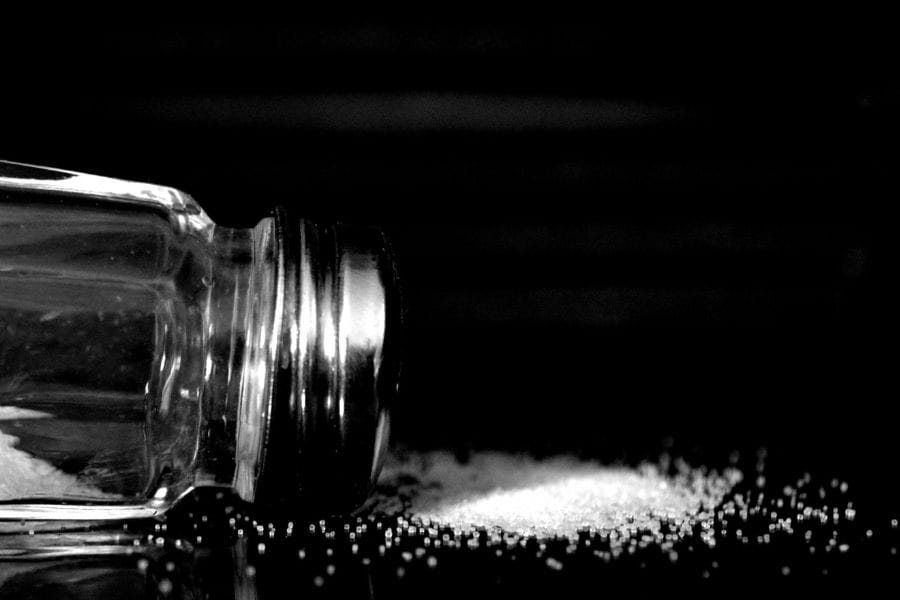EP 106: The Salt of the Earth (Sermon on the Mount Series – Matthew 5:13)

In this next episode of the Sermon on the Mount, we start with two common pictures we’re all familiar with from everyday life. No matter your location in the world—you know what salt and light are. We are to be salt, and we are to be light or better to state as the scripture states – we ARE salt, and we ARE light.
We’re going to take these one at a time, so today, we’re just working through Matthew 5:13:
“You are the salt of the earth, but if salt has lost its taste, how shall its saltiness be restored? It is no longer good for anything except to be thrown out and trampled under people’s feet.
We have a mission in this world as believers, just as the disciples of Jesus did sitting on the side of that mountain hearing him preach. We are the salt of the earth. Jesus wasn’t just speaking to those in first-century Palestine but future believers too. Those few men, weak and sinful like we are, did take the gospel and spread it throughout the earth, and it continues to spread through the disciples of Christ today. And if you’re in Christ, that’s you too, friend. You are the salt of the earth.
This verse in Matthew 5:13 is coming off the text we worked through last month on persecution, and Sinclair Ferguson states:
“Like salt, Christians may seem small and insignificant, powerless in a power-mad society. Yet, they have the ability to influence every segment of it and to permeate the whole. Salt is cheap; its value is minimal. But salt has unusual properties that far exceed its ‘value.’ So it is with the members of God’s kingdom. Like salt, there will be times when their true usefulness will become very clear.”
The world has been decaying since the fall. It is not getting better. Things may look good on the outside, but inside it is rotting away. Sin and evil are everywhere, and they are inside the heart of man. When society is void of the gospel, it will suffer moral decay.
When Jesus tells us we are the salt of the earth, we need to note; he is making a statement of fact. The mood of the verb here is indicative; it is not an imperative or a command. We are the salt of the earth. Keep that in your mind as we work through this and every time you read that verse! This is who we are as God’s children and kingdom people. We are salt.
Related Links:
Sermon on the Mount Series
Women’s Hope Podcast – Being Workers in Our Homes
Studies in the Sermon on the Mount by Martyn Lloyd Jones

The Sermon on the Mount by Sinclair Ferguson

Out of the Saltshaker and Into the World: Evangelism as a Way of Life by Rebecca Manley Pippert

Show Notes:
“Like salt, Christians may seem small and insignificant, powerless in a power-mad society. Yet, they have the ability to influence every segment of it and to permeate the whole. Salt is cheap; its value is minimal. But salt has unusual properties that far exceed its ‘value.’ So it is with the members of God’s kingdom. Like salt, there will be times when their true usefulness will become very clear.”
~ Sinclair Ferguson, The Sermon on the Mount
“The Christian shoemaker does his duty not by putting little crosses on the shoes, but by making good shoes because God is interested in good craftsmanship.”
~ Martin Luther
“Even a little salt makes itself known. When we sit down for dinner, all it takes is one little bite to know whether the food has been salted or not. Just a pinch of salt goes a long way. William Wilberforce, the man who almost single-handedly brought about the Slavery Emancipation Bill in England, was living proof of this. Dwarfed by disease, he did not appear to be a person who would accomplish anything. However, Boswell wrote of him, after listening to one of his speeches, “I saw a shrimp mount the table; but as I listened, he grew and grew until the shrimp became a whale.” Tiny, elfish, misshapen, he was salt to British society, not only bringing preservation but also enticement to Christ by his beautiful life. A little salt will make its presence felt. How beautiful is the life of a salty believer—bringing preservation to a decaying world as a living reproof to sin, an enticement to Christ, one who brings spice and flavor to life, one who makes others thirsty for Christ and life in Heaven.”
~ R. Kent Hughes, The Sermon on the Mount
“I was sitting in a barber chair when I became aware that a powerful personality had entered the room. A man had come quietly in upon the same errand as myself to have his hair cut and sat in the chair next to me. Every word the man uttered, though it was not in the least didactic, showed a personal interest in the man who was serving him. And before I got through with what was being done to me I was aware I had attended an evangelistic service, because Mr. D. L. Moodywas in that chair. I purposely lingered in the room after he had left and noted the singular affect that his visit had brought upon the barber shop. They talked in undertones. They did not know his name, but they knew something had elevated their thoughts, and I felt that I left that place as I should have left a place of worship.”
~ John MacArthur, Matthew 1-7 New Testament Commentary
“Speech is like salt: too little, and we do not taste the flavor of the food; too much, and we are left with the unpleasant taste of the salt. Like salt, our lives and our speech are to bring out the ‘flavor’ of Jesus Christ. Too much of ourselves—too much of our talk—will likewise leave an unpleasant taste. Be like Christ, then, lest others are not able to tell the difference between the salt and the meat, between the poverty of our witness and the goodness of the Lord Jesus they are invited to taste.”
~ Sinclair Ferguson, The Sermon on the Mount
“And when society does go bad, we Christians tend to throw up our hands in pious horror and reproach the non-Christian world; but should we not rather reproach ourselves? One can hardly blame unsalted meat for going bad. It cannot do anything else. The real question to ask is: where is the salt?”
John Stott, The Message of the Sermon on the Mount
“Is there any hope for us if we have become desalted? The answer is no – not in ourselves anyway. However, Jesus extends the metaphor into the supernatural, and here we must say that the answer is yes! Jesus is not saying that if a Christian loses his pungency, he cannot get it back, even by going to the source from which it came. Nothing but our own sin can keep us from being resalted. I once met a man who, in his sixties, was re-salted. He told me about how his life had become bland and insipid, and then he was confronted again with the necessity of a vital life for Jesus Christ and committed his life to him. For the next ten years of his life, he was incredibly salty in the world. The effect of his life is literally known by thousands. So one can be re-salted!”
~ R. Kent Hughes, The Sermon on the Mount
“‘Seasoning’ society is not a matter of being Scrooge-like personalities whose presence brings a pall of depression and whose entrance marks the exit of joy. On the contrary, the presence of God’s people should ‘increase the flavour’ of life in many different ways. After all, we come to our friends, neighbours, co-workers, or fellow students as those who have been – and still are – in the presence of Jesus Christ, who has given us abundant life (John 10:10). Everything about us should express the attractiveness as well as the holiness of our Lord.”
~ Sinclair Ferguson, The Sermon on the Mount
“We are salt, and he wants us to cultivate our saltiness by constantly communing with him and being constantly filled with the Spirit. Then he wants us to get out of the saltshaker and into the world—rubbed into the rotting wounds of the world. And he wants us to remember that though we are not much, a little salt goes a long way!”
~ R. Kent Hughes, The Sermon on the Mount ESV Commentary
“God uses the small things and the small people. God uses you and me that he might do his work in the world. As a matter of fact, the smaller you can become, the more effective his work in you will be. Do you know what we are to be? We are to be picture frames within which Jesus Christ is to be seen. God is not interested in its being a gold frame or a beautifully carved frame. He is just interested in its being an empty frame because he knows that when you come to him with that, he can put Christ there. And when people look at you, they will see Jesus.”
~ James Montgomery Boice, The Sermon on the Mount, Matthew 5-7
Scripture References:
- Matthew 5:10-12
- Matthew 5-7
- Matthew 5:13
- Mark 9:50
- Luke 14:34
- Colossians 4:6
- Ephesians 4:29
- John 17:15-19
- 1 Corinthians 1:26-31
Recommended Resources:
- Studies in the Sermon on the Mount by Martyn Lloyd Jones
- Sermon on the Mount The: Matthew 5-7 Expositional Commentary by James Montgomery Boice
- Matthew 1-7 MacArthur New Testament Commentary by John MacArthur
- Expository Thoughts on the Gospel of Matthew by J.C. Ryle
- The Sermon on the Mount: The Message of the Kingdom (ESV Edition) by R. Kent Hughes
- Sermon on the Mount by Sinclair Ferguson
- The Beatitudes: An Exposition of Matthew 5:1-12 by Thomas Watson
- The Message of the Sermon on the Mount by John Stott
- Sermon on the Mount Teaching Series by Sinclair Ferguson at Ligonier Connect
- Logos Bible Software
- Bible Memory App
- Study Guide for Sermon on the Mount


